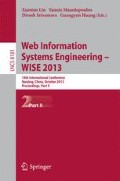Abstract
This paper studies the phenomenon of the evolution of cooperation in networks, where each player in networks plays an iterated game against its neighbours. An iterated game in a network is a multiple round game, where, in each round, a player gains payoff by playing a game with its neighbours and updates its action by using the actions and/or payoffs of its neighbours. The interaction model between the players is usually represented as a two-player, two-action (i.e., cooperation and defection) Prisoner’s Dilemma game. Currently, many researchers developed strategies for the evolution of cooperation in structured networks in order to enhance cooperation, i.e., to increase the proportion of cooperators. However, experimental results, reported in current literature, demonstrated that each of these strategies has advantages and disadvantages. In this paper, a self-organisation based strategy is proposed for the evolution of cooperation in networks, which can utilise the strengths of current strategies and avoid the limitations of current strategies. The proposed strategy is empirically evaluated and its good performance is exhibited. Moreover, we also theoretically find that, in static networks, the final proportion of cooperators evolved by any pure (or deterministic) strategies fluctuates cyclically irrespective of the initial proportion of cooperators.
Access this chapter
Tax calculation will be finalised at checkout
Purchases are for personal use only
Preview
Unable to display preview. Download preview PDF.
References
Hamilton, W.D.: The genetical evolution of social behaviour. J. Theor. Biol. 7, 1–16 (1964)
Axelrod, R., Hamilton, W.D.: The evolution of cooperation. Science 211, 1390–1396 (1981)
Hofmann, L.M., Chakraborty, N., Sycara, K.: The evolution of cooperation in self-interested agent societies: a critical study. In: Proc. of AAMAS 2011, Taipei, Taiwan, pp. 685–692 (May 2011)
Guan, J.Y., Wu, Z.X., Wang, Y.H.: Effects of inhomogeneous activity of players and noise on cooperation in spatial public goods games. Phys. Rev. E 76, 056101 (2007)
Szolnoki, A., Perc, M.: Group-size effects on the evolution of cooperation in the spatial public goods game. Phys. Rev. E 84, 047102 (2011)
Wedekind, C., Milinski, M.: Cooperation through image scoring in humans. Science 288, 850–852 (2000)
Fehr, E., Fischbacher, U.: The nature of human altruism. Nature 425, 785–791 (2003)
Kagel, J.H., Roth, A.E.: The handbook of experimental economics. Princeton University Press (1995)
Dawes, R.M.: Social dilemmas. Ann. Rev. Psychol. 31, 169–193 (1980)
Hassell, M.P., Comins, H.N., May, R.M.: Species coexistence and self-organizing spatial dynamics. Nature 370, 290–292 (1994)
Abramson, G., Kuperman, M.: Social games in a social network. Phys. Rev. E 63, 030901 (2001)
Szabo, G., Vukov, J.: Cooperation for volunteering and partially random partnership. Phys. Rev. E 69, 036107 (2004)
Lieberman, E., Hauert, C., Nowak, M.A.: Evolutionary dynamics on graphs. Nature 433, 312–316 (2005)
Nowak, M.A., May, R.M.: Evolutionary games and spatial chaos. Nature 359, 826–829 (1992)
Nakamaru, M., Matsuda, H., Iwasa, Y.: The evolution of cooperation in a lattice-structured population. J. Theor. Biol. 184, 65–81 (1997)
Ifti, M., Killingback, T., Doebeli, M.: Effects of neighbourhood size and connectivity on the spatial continuous prisoner’s dilemma. J. Theor. Biol. 231, 97–106 (2004)
Santos, F.C., Pacheco, J.M.: Scale-free networks provide a unifying framework for the emergence of cooperation. Phys. Rev. Lett. 95, 098104 (2005)
Axelrod, R.: The evolution of cooperation. New York (1984)
Axelrod, R., Dion, D.: The further evolution of cooperation. Science 242, 1385–1390 (1988)
Nowak, M., Sigmund, K.: Tit for tat in heterogeneous populations. Nature 355, 250–253 (1992)
Nowak, M., Sigmund, K.: A strategy of win-stay, lose-shift that outperforms tit-for-tat in the prisoner’s dilemma game. Nature 364, 56–58 (1993)
Tang, C., Wang, W., Wu, X., Wang, B.: Effects of average degree on cooperation in networked evolutionary game. Eur. Phys. J. B 53, 411–415 (2006)
Santos, F.C., Pacheco, J.M., Lenaerts, T.: Evolutionary dynamics of social dilemmas in structured heterogeneous populations. Proc. Natl. Acad. Sci. 103, 3490–3494 (2006)
Kaelbling, L.P., Littman, M.L., Moore, A.W.: Reinforcement learning: A survey. Journal of AI Research 4, 237–285 (1996)
Barabasi, A.L., Albert, R.: Emergence of scaling in random networks. Science 286(5439), 509–512 (1999)
Watts, D.J., Strogatz, S.H.: Collective dynamics of ‘small-world’ networks. Nature 393, 440–442 (1998)
Newman, M.E.J.: The structure of scientific collaboration networks. Proc. Natl. Acad. Sci. 98, 404–409 (2001)
Ebel, H., Bornholdt, S.: Coevolutionary games on networks. Phys. Rev. E 66, 056118 (2002)
Zimmermann, M.G., Eguiluz, V.M.: Cooperation, social networks, and the emergence of leardership in a prisoner’s dilemma with adaptive local interactions. Phys. Rev. E 72, 056118 (2005)
Kautz, H., Selman, B., Milewski, A.: Agent amplified communication. In: AAAI 1996, Portland, pp. 3–9 (1996)
Szabo, G., Fathb, G.: Evolutionary games on graphs. Phys. Rep. 446, 97–216 (2007)
Hauert, C., Schuster, H.G.: Extending the iterated prisoner’s dilemma without synchrony. J. Theor. Biol. 192, 155–166 (1998)
Author information
Authors and Affiliations
Editor information
Editors and Affiliations
Rights and permissions
Copyright information
© 2013 Springer-Verlag Berlin Heidelberg
About this paper
Cite this paper
Ye, D., Zhang, M. (2013). A Study on the Evolution of Cooperation in Networks. In: Lin, X., Manolopoulos, Y., Srivastava, D., Huang, G. (eds) Web Information Systems Engineering – WISE 2013. WISE 2013. Lecture Notes in Computer Science, vol 8181. Springer, Berlin, Heidelberg. https://doi.org/10.1007/978-3-642-41154-0_21
Download citation
DOI: https://doi.org/10.1007/978-3-642-41154-0_21
Publisher Name: Springer, Berlin, Heidelberg
Print ISBN: 978-3-642-41153-3
Online ISBN: 978-3-642-41154-0
eBook Packages: Computer ScienceComputer Science (R0)

